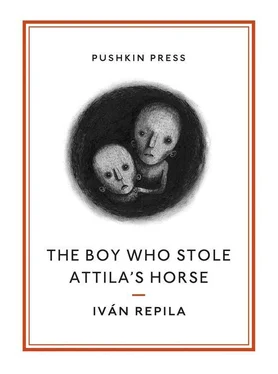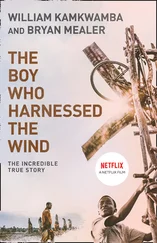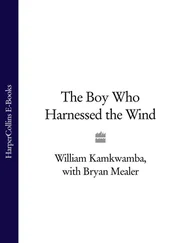‘Cunnard burds, un cunnard fesis, nemnay! Nemnay fa wampus! Saired!’
After so many weeks listening to Small’s crackpot monologues Big can’t help but see the irony in the strange process that has overcome him, and for the first time in a long while he sees a funny side, and has to discreetly stifle a laugh.
‘It’s all right. I’ll mend the wampus for you, don’t worry. The wampus is under control.’
And the second he utters the phrase he explodes in a snort of laughter, loud like a collapsing quarry. And just like a landslide he can’t stop it, not even when he sees the dagger eyes his brother is throwing him.
‘Forgive me. I’m sorry. Don’t get angry. It’s just the wampus…’
And again he bursts out laughing, beside himself now, out of control, the fits feeding themselves on more fits in an endless cycle of wampus. He laughs so hard that he falls to his knees clasping his middle, his belly, his jaw and his throat hurting. Small, too, is beside himself, but for other reasons: rage, puzzlement, fear; he is seized by a new kind of loneliness, and for a few seconds drastic thoughts race around his head: he might never speak properly again, might never be able to write or leave his mark. He might box his brother to death, stamp over his spine until it crunches underfoot, and leave him paralysed. He might never be able to say goodbye, or say I love you, or throw insults. Pointing his finger at Big, still on the ground on all fours, he screams:
‘Raturl! Filffif doan gon hurtul! Gon hurtul dop unterme! FOTON DUCRUZZER!’
Like adding fuel to the fire. Small’s accusing finger, the indignant look on his face, and the insult that the words ‘foton ducruzzer’ are clearly meant to represent are too much for Big. Doubled up in stitches he tries to find some words of comfort for his brother. Small launches a useless assault, hitting him with a few weak blows, and Big makes an effort to calm him down.
‘Don’t hit me. I’m sorry. I’ll stop laughing now.’
Small hits him again.
‘Stop it! I’ve told you I’m sorry. Let me get up.’
Small makes as if to throw another punch, but instead he says:
‘Yefonk!’
Big suppresses a fresh attack of the giggles.
‘Yes, I fonk. Don’t worry. I know what’s happening to you.’
‘Luno wonsat neme? Nenay.’
‘You’re suffering from a kind of speech defect. It’s not serious. It will pass.’
‘Surro?’
‘Yes, surro. Believe me. You have to rest and try to relax. You can’t keep thinking all the time like you have these last days.’
‘Nime der ra. Me ra. Holenark fut inun wound ma vote. Shelling, or darjung.’
‘I know, I know.’
Big puts his arm around Small, who receives the display of affection with a shudder, then bursts into tears, letting his trembling body fold into his brother’s. Between sniffles, Small says:
‘Amam cor.’
A few hours later, Small is practising speaking under his breath, like a slave learning how to write in secret with old exercise books. He thinks ‘brother’ and his mouth utters ‘furo’. He thinks ‘donkey’ and says ‘kenko’. Exasperated, he decides to start by repeating the simplest words, those with a single syllable. He thinks: ‘sun’.
‘Crun.’
‘Faa.’
‘Sato.’
‘Sot.’
‘Sonn.’
‘Sonn.’
‘Sun.’
He can hardly believe it as he speaks the word. He repeats it, louder:
‘Sun.’
‘Sun!’
‘SUN!’
He erupts with joy. Getting to his feet he cries ‘SUN’ and sploshes around the well with his arms raised, clenching his fists and his eyes, ‘SUN’ and ‘SUN’ and ‘SUN’. Big, who until that point was sleeping peacefully, is wrenched from his dream by the revelling gladiator.
‘What about the sun? It’s already night time!’ he says, his eyes bleary. Small just smiles, satisfied.
OVER THE FOLLOWING DAYS the aphasia gradually fades. Small can pronounce the simplest words without a problem, but those that are more complex still defeat him, especially when he tries constructing elaborate sentences or speeches. An inexact means of communication, which must recover the very kernels of understanding.
‘Hunger.’
‘You’ll eat what is strictly necessary.’
And yet, Small is right. Food is becoming scarce, almost certainly as a result of the brothers’ continued plunder of every inch of the well as they forage for roots and insects, small eggs and maggots. What’s more, Big’s decision over the distribution of the food means that Small can barely move, and he spends all day prone on the floor like a vegetable, growing deep ulcers between his buttocks and on his legs. Although skinny and pale, Big retains a certain vigour, the result of a more balanced diet and the obsessive repetition of his exercises. He knows that in these deprived conditions his brother’s time is running out, so in the hope of finding something for him to eat he sinks his hands into the last crevices of the well, delving shoulder-deep into the hard earth. He spends hours like this, then comes across an earthworm, a significant portion of which he loses as he pulls apart the earth to reach it. He hands the worm over and his brother bolts it down without saying a word or moving anything but his tongue.
Small savours the earthworm and imagines he is sucking on a magic pill. There and then he develops superhuman powers: he can fly like an eagle, be as strong as ten men; he is capable of understanding every language on the planet. He decides to leave the well and starts flapping his arms. He lifts up off the ground, one, two, three hands high. He comes across fresh roots. His brother becomes small. And just as his head emerges and he sees the full magnitude of the forest, a rough stake jabs him out of nowhere and he plummets down. He gets up, in pain, but now more sticks appear, walloping him in the nape of his neck and on his arms, and again he falls. His pride is injured now, and he rises up, carried on a typhoon of hate, faster and faster, and at the summit he is showered by a hundred, a thousand sticks that strike him like the keys of a mute organ. He zooms about, blindly smashing into them — a mosquito trapped inside a swarm. Yet, he doesn’t fall. The blows keep coming and he doesn’t fall. In the end, with nothing to lose, he decides to test whether, among the various gifts that the earthworm bestowed on him, immortality is one of them, and he declares war. An armed mob confronts him. You have no right to fight, they tell him. Next thing, Small attacks.
In the afternoon Big gives up and sits down next to Small. The hunger remains. One of the brothers struggles to remove the latent idea of cannibalism from his head. The minutes slide over them as if the well were a courtyard of abandoned statues in the vault of mother earth.
A plump bird lands at their feet, cawing.
‘FILTHY SON OF A BITCH.’
The bird was dead within the two or three seconds it took the brothers to surround and jump on top of it. Driven by his hunger, it was Small who moved fastest and clutched the bird by its neck, rendering useless any effort by the animal to fly off again. He grasped so tightly with his forefingers and thumbs that by the time the bird had suffocated its head was practically separate from its body.
‘You little pile of shit.’
It was then that the problems began. Small’s first instinct was to sink his mouth into the belly of the bird, but his brother stopped him, throwing him off with a hefty shove. Small fell flat on his back, switching from jubilation to shock, from shock to anger.
‘Miserable fucker.’
While blocking his brother’s onslaught, Big tried to explain to him that they would not eat the bird right then. Their shrunken stomachs wouldn’t be able to digest the raw meat of the animal, or its bile and intestines. They would have dreadful stomach pains, would vomit virtually at the first mouthful and, without a doubt, what little they might manage to digest and pass through their intestines would come straight out the other end in the form of torrential diarrhoea.
Читать дальше












